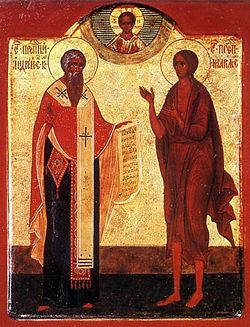Andrea wa Krete
Mandhari
(Elekezwa kutoka Andrew of Crete)
| Andrea wa Krete | |
|---|---|
 Picha takatifu ya Andrea wa Krete (kushoto) na Maria wa Misri | |
| Feast | |
Andrea wa Krete (kwa Kigiriki Ἀνδρέας Κρήτης; lakini pia Andrea wa Yerusalemu; Damasko, Siria, 650 hivi – Mutilene, 4 Julai 712 au 726 au 740), alikuwa askofu, mwanateolojia na mhubiri maarufu[1] tena mtunzi wa sala, nyimbo na tenzi fasaha sana ili kumsifu Mungu na Bikira Maria kama Mama wa Mungu asiye na doa na mpalizwa mbinguni [2][3].
Tangu kale anaheshimiwa na Waorthodoksi na Wakatoliki kama mtakatifu.
Sikukuu yake huadhimishwa tarehe 4 Julai[4].
Tazama pia
[hariri | hariri chanzo]- Watakatifu wa Agano la Kale
- Orodha ya Watakatifu Wakristo
- Orodha ya Watakatifu wa Afrika
- Orodha ya Watakatifu Wafransisko
Tanbihi
[hariri | hariri chanzo]- ↑ A list of forty of his discourses, together with twenty-one edited sermons, is given in Patrologia Graeca, XCVII, 801-1304.
- ↑ Today, Saint Andrew is primarily known as a hymnographer. He is credited with the invention (or at least the introduction into Orthodox liturgical services) of the canon, a new form of hymnody. Previously, the portion of the Matins serrains inserted between the scripture verses. Saint Andrew expanded these refrains into fully developed poetic Odes, each of which begins with the theme (Irmos) of the scriptural canticle, but then goes on to expound the theme of the feast being celebrated that day (whether the Lord, the Theotokos, a saint, the departed, etc.). His masterpiece, the Great Canon (also known as the Canon of Repentance or the Great Canon of Repentance), is the longest canon ever composed (250 strophes). It is written primarily in the first person, and goes chronologically through the entire Old and New Testaments drawing examples (both negative and positive) which it correlates to the need of the sinful soul for repentance and a humble return to God. It is divided into four parts (called methymony) which are chanted at Great Compline on the first four nights of Great Lent (one part per night); later, it is chanted in its entirety at Matins on Thursday of the fifth week of Great Lent. Twenty-four canons are reputed to have been written by Saint Andrew of Crete. Of these, we can be more or less certain that he wrote fourteen, including: the canons for the Resurrection of Lazarus (chanted at Compline on the Saturday—i.e., Friday night—before Palm Sunday); the Conception of St. Anne (9 December); the Maccabean Martyrs (1 August); St. Ignatius of Antioch (20 December), as well as four Triodia, and no fewer than one hundred and seven irmoi.
- ↑ https://www.santiebeati.it/dettaglio/92517
- ↑ Martyrologium Romanum
Viungo vya nje
[hariri | hariri chanzo]- St Andrew of Crete Orthodox Icon and Synaxarion
- Saint Andrew, Archbishop of Crete Prolog from Ochrid (July 4)
- Andrew of Crete - Encomium on St Nicholas of Myra - English translation of Oration 18.
 "St. Andrew of Crete". Catholic Encyclopedia. New York: Robert Appleton Company. 1913.
"St. Andrew of Crete". Catholic Encyclopedia. New York: Robert Appleton Company. 1913.- Great Canon article from OrthodoxWiki
- Great Canon of Saint Andrew in Old Church Slavonic
- Great Canon of Saint Andrew of Crete in Parallel Ukrainian and English texts Ilihifadhiwa 2 Machi 2014 kwenye Wayback Machine.
- Great Canon of Saint Andrew of Crete, First Week of the Great Fast — in English Ilihifadhiwa 3 Machi 2014 kwenye Wayback Machine.
- Orthros with the Great Canon of Saint Andrew of Crete, Thursday of the Fifth Week of the Great Fast in Parallel Ukrainian and English texts Ilihifadhiwa 7 Machi 2016 kwenye Wayback Machine.
| Makala hii bado ni mbegu. Je, unajua kitu kuhusu Mkristo huyu, kama wasifu wake, habari za maisha au kazi yake? Je, unaona habari katika Wikipedia ya Kiingereza au lugha nyingine zinazofaa kutafsiriwa? Basi unaweza kuisaidia Wikipedia kwa kuihariri na kuiongezea habari. |
